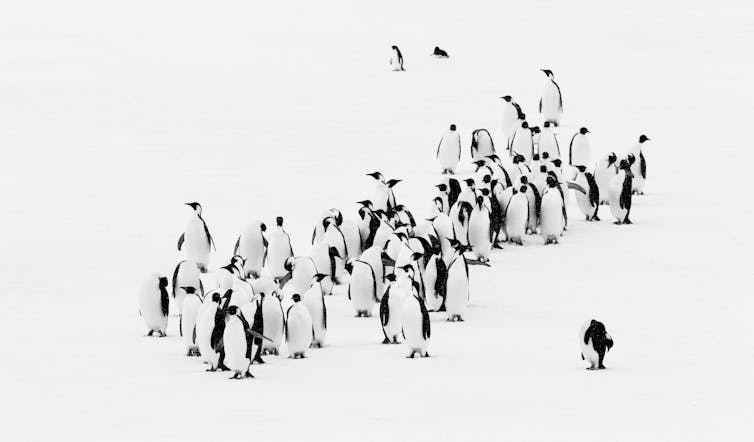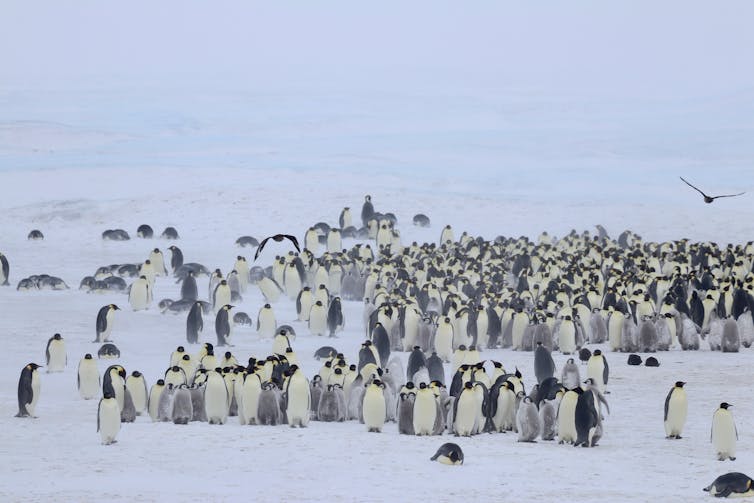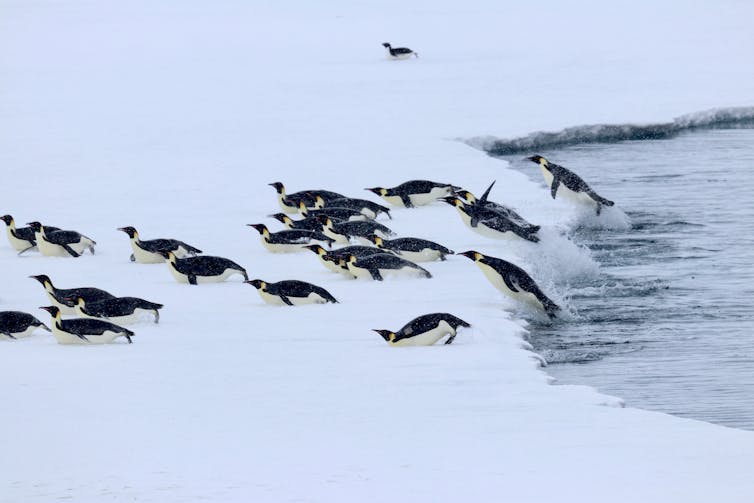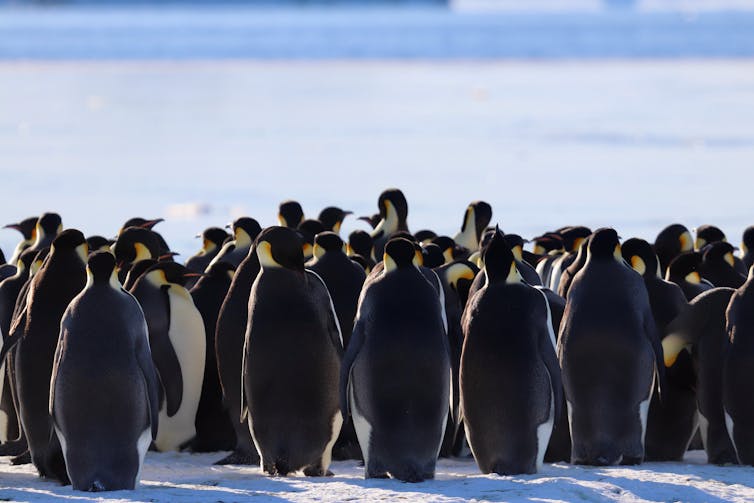.jpg?ext=.jpg)
France sets out long-term nuclear recycling plans
.jpg?ext=.jpg)
Emperor penguins face a bleak future – but some colonies will do better than others in diverse sea-ice conditions
 Sara Labrousse/French Polar Institute, CC BY-SA
Sara Labrousse, Sorbonne Université and Michelle LaRue, University of Canterbury
Sara Labrousse/French Polar Institute, CC BY-SA
Sara Labrousse, Sorbonne Université and Michelle LaRue, University of CanterburyThe long-term future looks bleak for Emperor penguins, but our new research shows some birds may be able to survive in certain conditions, depending on where they live, at least for the next few decades.
Over the past two years, Antarctic sea ice has declined dramatically, prompting scientists to suggest it could reach a “new state”.
A study based on satellite images shows that sea ice broke out early in Antarctica’s Bellingshausen Sea in 2022, potentially resulting in breeding failures across several Emperor penguin colonies in that region.
Our research shows Emperors form colonies in surprisingly diverse environmental conditions that vary depending on location around the continent. Within each of these regions, there is little difference between where birds make their homes and other sites, suggesting they could shift if they had to. This provides a ray of hope in an otherwise bleak outlook.
Emperor penguins may be the only birds to rarely set foot on land. They are unique among penguin species in that they breed on sea ice during the harsh Antarctic winter.
 Male Emperor penguins incubate eggs and raise the chicks on sea ice during the Antarctic winter. Sara Labrousse/French Polar Institute, CC BY-SA
Male Emperor penguins incubate eggs and raise the chicks on sea ice during the Antarctic winter. Sara Labrousse/French Polar Institute, CC BY-SA
We know that they need “fast ice” – the coastal sea ice attached to the Antarctic continent or ice shelves. But they actually inhabit a range of fast-ice locations that differ in the timing of ice formation, how much ice forms and breaks, and even how close they get to other penguin species.
Depending on where they are along the Antarctic coast, Emperors make use of the habitat available to them. Their behaviour may be flexible enough to allow some colonies to cope better in a warming world.
Why fast ice is important
Emperor penguins rely on fast ice as a stable platform for their breeding season. Female Emperors lay their eggs and the males incubate them for about two and a half months.
Even though Antarctica’s sea ice is diminishing, this refers to a measure known as “sea ice extent”, which includes all sea ice covering the polar ocean, whether it is fast ice or drifting pack ice.
A decrease in sea ice extent is not necessary linearly linked to a drop in the area covered by fast ice (although the reverse is true).
If fast ice were to disappear, we would expect more than 90% of Emperor colonies to become functionally extinct by the end of the century. However, our study suggests that in the short to medium term, we should consider the differences in the penguins’ breeding habitats when we think about ways to protect them.
Emperors are unlikely to move far
By looking a little closer at different fast-ice habitats, we found Emperor penguins have certain preferences. The persistence of the ice (how long it lasts into the summer) was important because chicks had more time to develop their water-proof swimming feathers.
In some cases, being close to Adélie penguins made a difference. In other cases, Emperors preferred sites with shallow ocean depths below the colony.
Our results suggest that two of these habitat conditions support larger colonies: stable fast ice that lasts throughout the breeding season (with only small changes in the growth and retreat seasonal cycle) and a good balance between a fast-ice platform that is wide enough to raise chicks but close enough to the ocean to get food for them.
 Emperor penguins need access to the ocean to feed their chicks during the breeding season. Sara Labrousse/French Polar Institute, CC BY-SA
Emperor penguins need access to the ocean to feed their chicks during the breeding season. Sara Labrousse/French Polar Institute, CC BY-SAWe need further studies to clarify these links and the relationship between population size and habitat quality. In our study, we weren’t able to consider prey availability and there may be other factors that play an important role.
Previous research has already shown that Emperor penguins have limited capacity to disperse to find more suitable climate refuges. This is supported by the genetic partitioning among the penguin populations in different Antarctic regions we studied.
 Emperors don’t easily move to other breeding sites, even if the conditions are better. Sara Labrousse/French Polar Institute, CC BY-SA
Emperors don’t easily move to other breeding sites, even if the conditions are better. Sara Labrousse/French Polar Institute, CC BY-SAProtecting penguin habitat
Climate change is currently one of the main pressures driving Emperor penguins closer to extinction.
However, the latest global assessment by the Intergovernmental Science-Policy Platform on Biodiversity and Ecosystem Services (IPBES) clearly identified fishing activities as historic and current drivers of the erosion of marine biodiversity worldwide.
This is also true for Antarctica. While fishing pressure there is limited to a fraction of the global fishing fleet, some of the largest vessels target krill, a tiny shrimp-like crustacean consumed by many Antarctic predators, including Emperor penguins.
With climate models predicting further reductions in sea ice extent, new fishing grounds could open and amplify pressure on other Antarctic wildlife.
If we want to live in a world with Emperor penguins, the most important thing to do would be to cut greenhouse gas emissions steeply. Another key action could be to prevent fishing in areas where climate change will have the most impact.
In this respect, truly protected areas are one conservation tool at our disposal. Now that our research provides more detailed information about penguin habitats, we can begin the process of more careful planning for conservation.
The world’s largest marine protected area exists in the Ross Sea, which is home to about 25% of the world’s Emperor penguins. Lessons we learn from protection there could help mitigate future declines of Emperors around Antarctica.![]()
Sara Labrousse, Chercheuse en écologie polaire, Sorbonne Université and Michelle LaRue, Associate Professor in Conservation Biology, University of Canterbury
This article is republished from The Conversation under a Creative Commons license. Read the original article.
